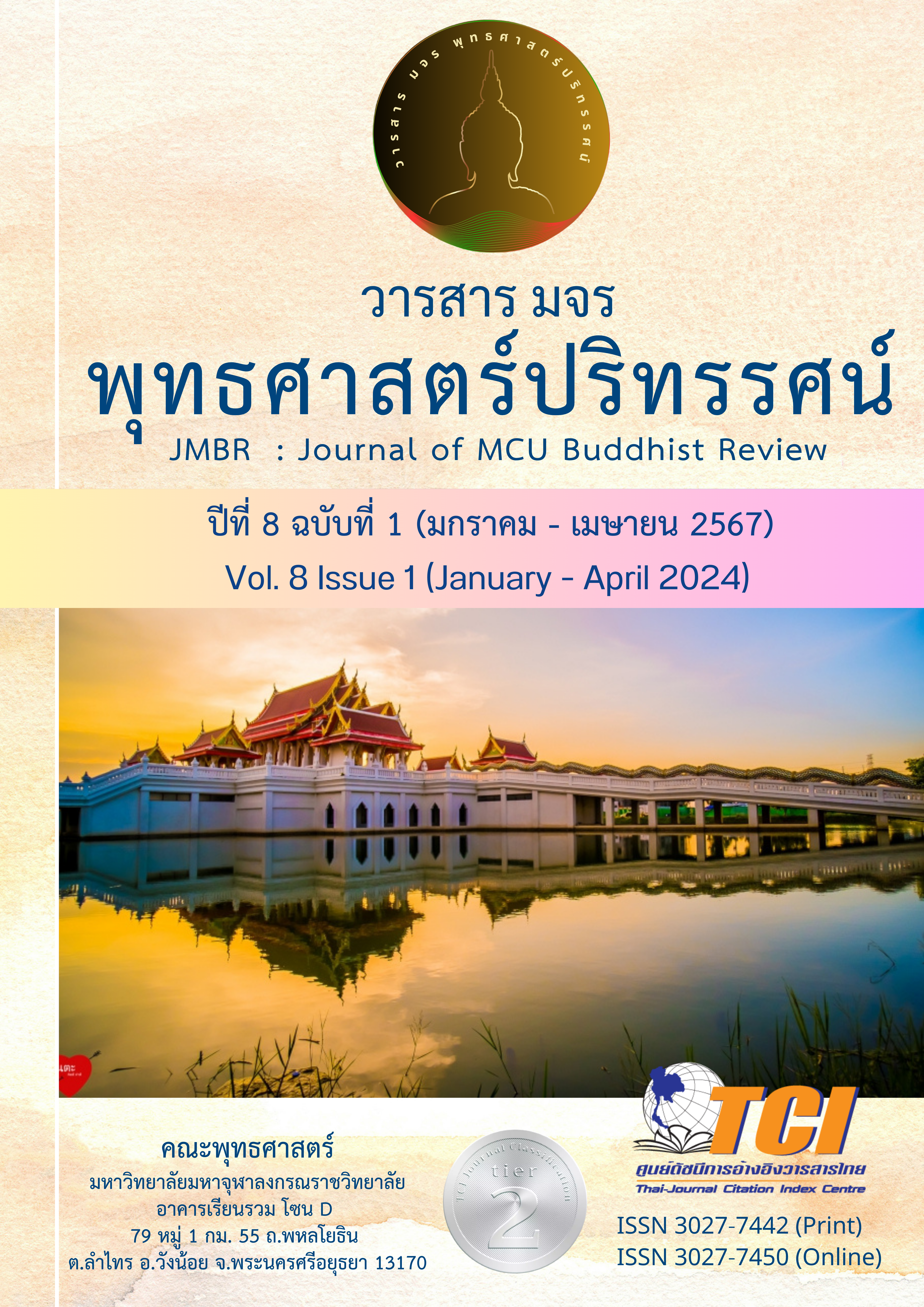การนำเสนอการพัฒนาสุขภาพจิตสำหรับผู้ปฏิบัติธรรมด้วยธรรมคีตะออนไลน์
Main Article Content
บทคัดย่อ
บทความวิจัยนี้มีวัตถุประสงค์ 1) เพื่อศึกษาปัญหาและสภาวะสุขภาพจิตสำหรับผู้ปฏิบัติธรรม 2) เพื่อศึกษากระบวนการพัฒนาสุขภาพจิตสำหรับผู้ปฏิบัติธรรมด้วยธรรมคีตะออนไลน์ 3) เพื่อนำเสนอการพัฒนาสุขภาพจิตสำหรับผู้ปฏิบัติธรรมด้วยธรรมคีตะออนไลน์ การวิจัยนี้เป็นการวิจัยเชิงเอกสาร โดยวิเคราะห์ข้อมูลเนื้อหาและนำเสนอแนวทางการพัฒนาสุขภาพจิตสำหรับผู้ปฏิบัติธรรมในสังคม ผลการวิจัยพบว่า 1) หลักการ แนวคิด เกี่ยวกับสุขภาพจิตและการพัฒนาสุขภาพจิต เน้นการส่งเสริมสุขภาพจิตในชุมชน และ การดูแลสุขภาพจิตและกายอย่างเป็นระบบ เช่น การออกกำลังกาย การฝึกสมาธิ และการติดต่อกับธรรมชาติ มีผลดีต่อสุขภาพทั้งจิตและร่างกาย การรักษาสุขภาพอย่างครบวงจรทั้งจิตและกายเป็นสิ่งสำคัญที่มนุษย์ควรใส่ใจและปฏิบัติตามอย่างสม่ำเสมอ 2) หลักพรหมวิหาร 4 เป็นหลักธรรมที่สำคัญในการครองคน เนื่องจากช่วยสร้างสังคมที่ดีและมีความสุข ประกอบด้วยเมตตา กรุณา มุทิตา และอุเบกขา เมื่อคนในสังคมมีหลักธรรมเหล่านี้อยู่ในจิตใจ เสริมสร้างสังคมที่มีความสงบสุข ปราศจากความขัดแย้งและความรุนแรง การสร้างความสุขทางสังคมตามหลักพรหมวิหารยังต้องการความร่วมมือจากทุกภาคส่วนในสังคม เพื่อส่งเสริมและปลูกฝังหลักธรรมเหล่านี้ให้กับคนในสังคมทุกคน 3) ธรรมคีตะคือการใช้ดนตรีและเครื่องดนตรีเพื่อสื่อถึงหลักธรรมของพระพุทธศาสนา เน้นสร้างความสงบสุขและความเคารพต่อพระพุทธศาสนาผ่านเนื้อเพลงที่สวยงามและสื่อความหมายของหลักธรรมพุทธเจ้า ธรรมคีตะจะช่วยให้ผู้เรียนเข้าใจและสนใจในการศึกษาธรรมะและปฏิบัติธรรมได้อย่างมีประสิทธิภาพผ่านสื่อออนไลน์ 4) การพัฒนาสุขภาพจิตของผู้ปฏิบัติธรรมด้วยธรรมคีตะออนไลน์ พบว่า 1) การนำหลักพรหมวิหาร 4 ไปใช้ในชีวิตประจำวันเสนอความเมตตาในการสร้างความสุขและสมดุลในชีวิต โดยส่วนใหญ่ใช้เพื่อเผื่อแผ่ความเมตตาให้ผู้อื่น, สร้างความสุข, เป็นผู้ให้, และการปล่อยวาง และ 2) การปฏิบัติธรรมโดยใช้ธรรมคีตะออนไลน์ช่วยให้โน้มน้าวจิตใจ, มีสติ, เผื่อแผ่ความเมตตา, ฟังเพลงธรรมะ, และส่งต่อความเมตตาแก่ผู้อื่น การปฏิบัติธรรมด้วยธรรมคีตะออนไลน์เป็นทางเลือกที่ดีในการสร้างสมดุลในชีวิตและความสุขในทุกวัน
Article Details

อนุญาตภายใต้เงื่อนไข Creative Commons Attribution-NonCommercial-NoDerivatives 4.0 International License.
- บทความที่ได้รับการตีพิมพ์เป็นลิขสิทธิ์ของวารสาร มจร พุทธศาสตร์ปริทรรศน์
- ข้อความใดๆ ที่ปรากฎในบทความที่ได้รับการตีพิมพ์ในวารสาร ถือเป็นความรับผิดชอบของผู้เขียนบทความ และข้อคิดเห็นนั้นไม่ถือว่าเป็นทัศนะและความรับผิดชอบของกองบรรณาธิการวารสาร มจร พุทธศาสตร์ปริทรรศน์
เอกสารอ้างอิง
กวินวุฒิ กลั่นไพฑูรย์ และคณะ. (2554). ผลของการฟังดนตรีตามความชอบและดนตรีธรรมชาติต่อการลดความเครียดของนักศึกษา. รายงานวิจัย คณะศิลปะศาสตร์: มหาวิทยาลัยเทคโนโลยีราชมงคลพระนคร.
ฉันทนา รวงผึ้ง. (2563). การสร้างความสุขอย่างยั่งยืนเชิงพุทธบูรณาการ. วารสารมหาจุฬาวิชาการ. 7(3),1-16.
ธิดารัตน์ เสรีขจรจารุ. (2564). แนวทางการพัฒนาการบริหารงานบุคคล ตามหลักพรหมวิหาร 4 โรงเรียนโครราชวิทยา อำเภอเมือง จังหวัดนครราชสีมา. วิทยานิพนธ์พุทธศาสตรมหาบัณฑิต บัณฑิตวิทยาลัย: มหาวิทยาลัยมหาจุฬาลงกรณราชวิทยาลัย.
พระครูวินัยธรอำนาจ (สวัสดี พลปญฺโญ), (2561). รูปแบบการพัฒนาสุขภาพจิตของผู้สูงอายุตามหลักธรรม: กรณีศึกษาตำบลบ้านปรือ อำเภอกระสัง จังหวัดบุรีรัมย์. วารสารวิจัยและพัฒนา มหาวิทยาลัยราชภัฎบุรีรัมย์. 13(2), 81-84.
พระครูปลัดไพฑูรย์ เมธิโก (มหาบุญ). (2557). พรหมวิหาร: ธรรมแนวทางการแก้ไขความขัดแย้งของสังคมไทย, วารสารมหาวิทยาลัยราชนครินทร์ สาขามนุษย์ศาสตร์และสังคมศาสตร์. 1(2), 59-60.
พระนิพนธ์ ฐานวโร (คำภาสี). (2565). ศึกษาพรหมวิหาร 4 ในฐานะการเจริญภาวนาในคัมภีร์วิสุทธิมรรค, วิทยานิพนธ์พุทธศาสตรมหาบัณฑิต บัณฑิตวิทยาลัย: มหาวิทยาลัยมหาจุฬาลงกรณราชวิทยาลัย.
พระมหาสุพรรณ สุภฺทโท และคณะ. (2565). การศึกษาหลักพุทธธรรมเพื่อส่งเสริมสุขภาพจิตผู้สูงอายุ ตำบลห้วยราชา อำเภอห้วยราช จังหวัดบุรีรัมย์. วารสารวิชาการ มจร บุรีรัมย์. 7(1), 234-238.
พระมหาสาคร ศรีดี. พุทธจริยธรรมกับดนตรี. สืบค้น 12 พฤศจิกายน 2566 จาก https://www.thaicadet .org/Buddhism/BuddhistEthics-Music.html
มหาจุฬาลงกรณราชวิทยาลัย. (2539). พระไตรปิฎกภาษาไทย ฉบับมหาจุฬาลงกรณราชวิทยาลัย. กรุงเทพฯ: มหาวิทยาลัยมหาจุฬาลงกรณราชวิทยาลัย.
มัลลิกา ภูมะธน และคณะ. ดนตรีในพระไตรปิฎกว่าด้วยการบำบัดบุญและการบรรลุธรรม. วารสารบัณฑิตแสงโคมคำ. 1(2), 8-9.
วาสนา พิทักษ์ธรรม และคณะ. (2559). การอยู่ร่วมกันอย่างสันติสุขที่ยั่งยืนในสังคมพหุวัฒนธรรม กรณีศึกษา งค์การบริหารส่วนตำบลกระโด อำเภอยะรัง จังหวัดปัตตานี. ใน การประชุมวิชาการและนำเสนอผลงานวิจัยระดังชาติ ราชธานีวิชาการ ครั้งที่ 1 “สร้างเสริมสหวิทยาการ ผสมผสานวัฒนธรรมไทย ก้าวอย่างมั่นใจเข้าสู่ AC. อุบลราชธานี: มหาวิทยาลัยราชธานี.
ศศิรัศม์ วีระไวทยะ. (2554). การนำเสนอยุทธศาสตร์การสร้างเครือข่ายความร่วมมือเพื่อเสริมสร้างสันติวัฒนธรรม โดยใช้สถานศึกษาเป็นฐาน”, วิทยานิพนธ์คุรุศาสตร์ดุษฎีบัณฑิต บัณฑิตวิทยาลัย: มหาวิทยาลัยจุฬาลงกรณ์ราชวิทยาลัย
สมเด็จพระพุทธโฆษาจารย์ (ป.อ.ปยุตฺโต). (2540). ธรรมะกับการทำงาน, พิมพ์ครั้งที่ 12. กรุงเทพฯ: บริษัทสหธรรมิก จำกัด.
อรุณี มิ่งประเสริฐ. (2557). การศึกษาสุขภาพจิตและความเครียดของนักศึกษาคณะเภสัชศาสตร์ มหาวิทยารังสิต. วารสารสังคมศาสตร์และมนุษยศาสตร์ มหาวิทยาลัยเกษตรศาสตร์. 40(2), 211-227.
อุบล จ๋วงพานิช และคณะ. (2012). ผลของดนตรีบำบัดต่อความวิตกกังวลและความปวดในผู้ป่วยมะเร็งที่ได้รับยาเคมีบำบัด. วารสารสมาคมพยาบาลฯ สาขาภาคตะวันออกเฉียงเหนือ. 30(1), 49-52.
Duangloy, D. et al. (2016). Music in Tipiṭaka for Therapy, Marit Making and Enlightenment. Journal of SaengKhomKham Buddhist Studies. 1(2), 119-134.


